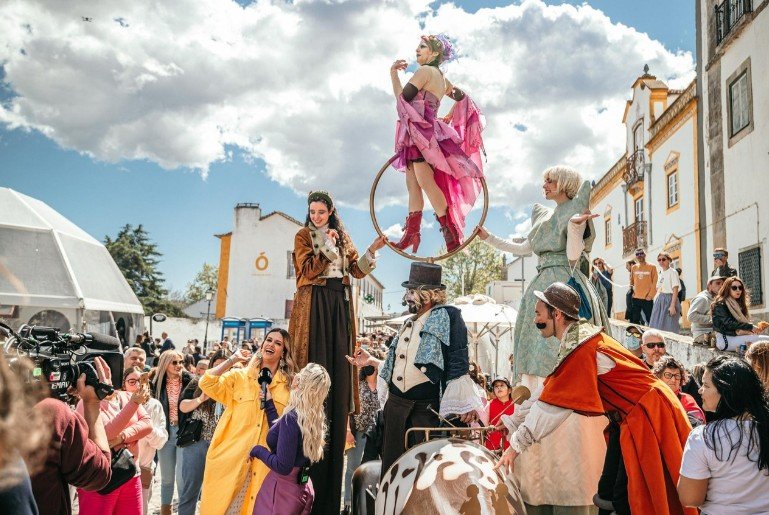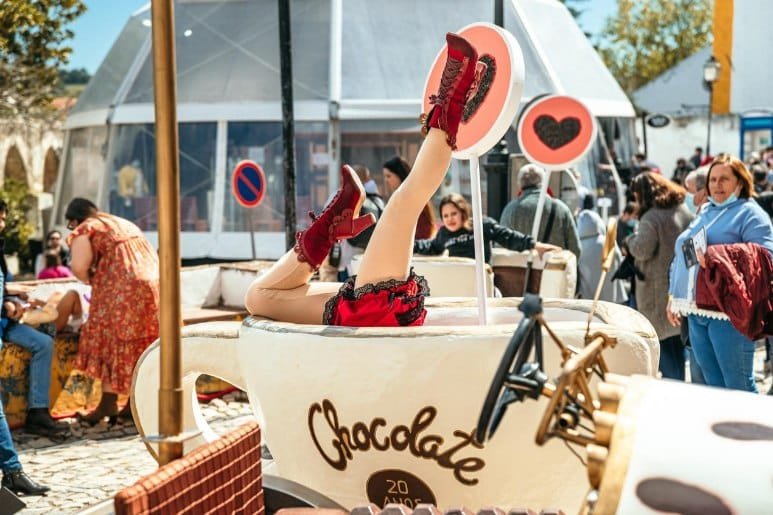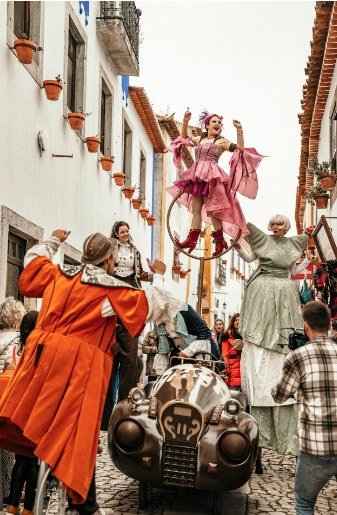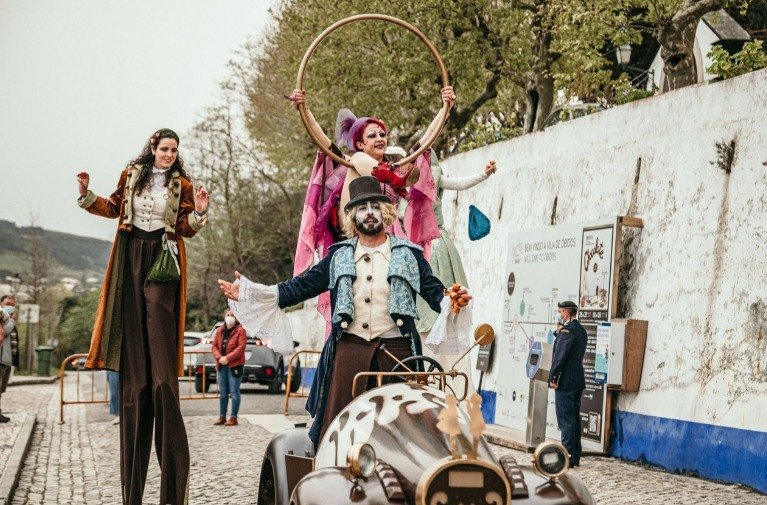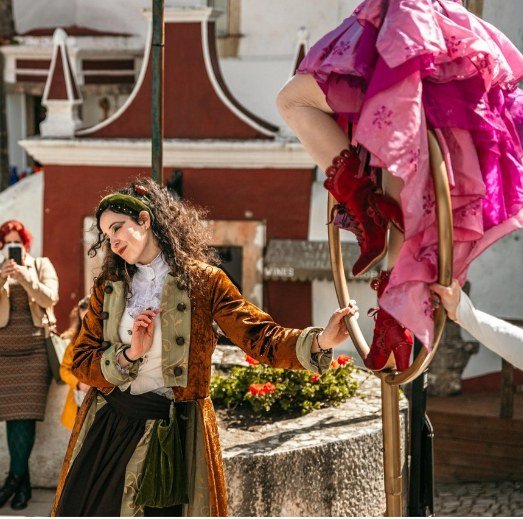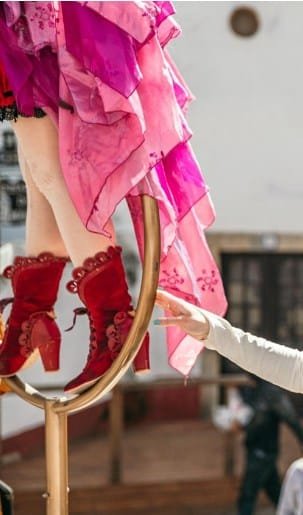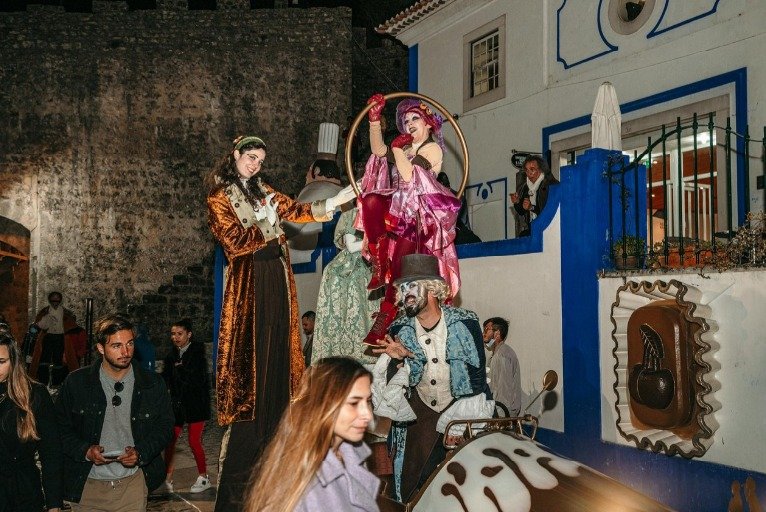Festival Internacional de Chocolate de Óbidos – Portugal 2026
Background & History
The Festival Internacional de Chocolate de Óbidos, Portugal’s trailblazing celebration of cacao, was born in 2002 as the European Chocolate Festival, a visionary initiative by the Municipality of Óbidos to fuse the town’s medieval heritage with culinary innovation. Nestled within the 12th-century walls of Óbidos, a UNESCO Creative City of Literature (designated in 2015, following a Gastronomy nod), the festival began as a modest weekend showcase of local chocolatiers, drawing 5,000 visitors to stalls along Rua Direita. Its rapid ascent stemmed from bold thematic frameworks—each year reimagining chocolate through prisms like mythology (2010’s “Gods & Heroes”), exploration (2018’s “Discoveries”), or 2025’s “Science”—propelling it into a 17-day global phenomenon by 2013. Today, it attracts over 250,000 attendees annually, generating €12 million for the local economy through tourism, artisan sales, and hospitality, while employing 85 tons of ethically sourced cocoa from regions like São Tomé and Príncipe.
The festival’s cultural significance is deeply tied to Óbidos’ history as the “Village of Queens,” a royal dowry gifted to seven Portuguese queens, from Urraca of Castile (1211) to Maria Anna of Austria (1668), lending it a regal allure. Its 2023 AHRESP Event of the Year award celebrated its eco-conscious ethos, including partnerships with fair-trade cooperatives and zero-waste trials, reducing packaging waste by 30% since 2020. The 2026 edition, likely extending the “Science” theme or pivoting to “Sustainability,” will spotlight cocoa’s climate challenges, with exhibits on drought-resistant farming. Over 100 international chefs, from Belgium’s Dominique Persoone to Brazil’s Diego Lozano, collaborate annually, crafting 1,500+ unique confections. The event doubles as an educational platform, with the Chocolate Universe pavilion tracing cacao’s 5,000-year journey from Olmec rituals to Portugal’s 16th-century trade dominance, blending gastronomy with anthropology.
Economically, it sustains 70+ local vendors year-round, funds artisan apprenticeships via Óbidos Creative EM, and drives hotel occupancy to 95% during March–April. Its global reach—welcoming delegations from Mexico, Ivory Coast, and Japan—reflects Óbidos’ Roman-Moorish roots as a cultural crossroads, while initiatives like solar-powered stalls and biodegradable cutlery underscore its forward-thinking ethos. This alchemy of heritage, innovation, and inclusivity—free peripheral markets alongside ticketed immersions—makes it a beacon for families, academics, and epicureans, cementing Óbidos as a sweet nexus of global dialogue.
Enjoy Your Event Stress-Free with Euro Travelo
Planning a trip to attend a festival, concert, or business event in Europe can be overwhelming—tickets, travel, accommodation, and local logistics all take time and effort. Euro Travelo makes it simple by providing everything you need through one trusted company. You save time, avoid stress, and enjoy a seamless experience from start to finish.
Why Choose Euro Travelo:
- Secure and easy ticket booking for concerts, festivals, theaters, and business events.
- Complete travel planning including flights, trains, and local transportation.
- Accommodation arrangements near event venues, tailored to your needs.
- Convenient local transfers, from airport pickups to private shuttles.
- On-site concierge support to help you navigate venues and schedules.
- Custom itineraries and experience packages combining multiple events, tours, and activities.
- Secure payment process, making it safe and convenient to book all services online.
- Flexibility: even if you need only one service, we can assist individually.
Event Highlights
- Main activities or performances: Immerse in 20+ interactive zones, including live sculpting of 12 monumental chocolate artworks (up from 11 in 2025, e.g., a 2-meter AI robot or Newton’s apple tree); the SMEG/CALLEBAUT Stage hosts 100+ chefs like Francisco Siopa, who crafts liquid-nitrogen truffles, while the AEG/PINGO DOCE Stage features sensory battles pairing 1,500+ chocolates with Alentejo wines, with real-time audience scoring via a festival app. Nightly fado concerts near Fonte Velha blend cocoa-inspired lyrics with acoustic strums.
- Special traditions or features: The “Chocolatier of the Year” contest, detailed at festivalchocolate.cm-obidos.pt, pits artisans in 3-hour sculpt-offs—2025’s winner carved a chocolate double helix—raising €7,000 for local schools via auctions; the Chocolate Laboratory, a 7-ton edible structure, offers 50+ daily workshops on tempering, emulsification, and molecular techniques, a hallmark since 2003. Sustainability talks on cocoa farming, led by São Tomé cooperatives, debut in 2026.
- Unique attractions for visitors: Twelve sculptures, evolving weekly (9 first weekend, 12 by finale), feature QR-linked stories on science milestones (e.g., Galileo’s telescope in dark chocolate); the Dino Park expands with augmented-reality fossil hunts, letting kids mold “extinct” treats; the Chocolate Universe pavilion uses VR headsets to simulate cacao’s transatlantic voyage; family zones like the Children’s Chocolate Village offer puppet shows, face painting, and eco-craft classes, ensuring accessibility for all ages.
Date & Duration
- Dates: dates to be announced
Venue / Location
The festival envelops Óbidos’ 1.5 km² medieval core, a fortified gem in Leiria District, 85 km north of Lisbon, with 1,800 residents and a UNESCO Creative City of Literature title. Key venues include the Pousada Castelo de Óbidos (royal chambers for VIP tastings), Largo de São Pedro (Town Hall plaza with 80+ vendor stalls), Rua Direita (pedestrian artery for street theater), and the aqueduct gardens (alfresco chocolate-wine pairings). The Fonte Velha square hosts acoustic fado, while the Porta da Vila gate serves as the main entry with ticket booths. The town’s 18 towers, 13-meter walls, and Roman-era aqueduct create a time-warped ambiance, enhanced by jasmine-draped facades and azulejo tiles. Accessibility is prioritized with ramps, tactile paths, and shuttles navigating cobblestones, ensuring inclusivity across the 14-hectare site.
- Google Maps Address: Óbidos Castle, Paço Real, 2510-084 Óbidos, Portugal (https://maps.google.com/?q=Óbidos+Castle,+Paço+Real,+2510-084+Óbidos,+Portugal)
Ticket Information
- How tickets are sold: Purchase via https://obidos.bol.pt for e-tickets with QR codes, offering single-day, weekend, or family bundles (5% early-bird discounts until January 2026); on-site booths at Porta da Vila and Largo de São João (10:00–21:00, cash/card/Venmo); group bookings for schools (25+ students), travel agencies, or corporate teams via festivalchocolate@cm-obidos.pt, with tailored itineraries; lottery for 100 exclusive chef-led masterclasses announced on @obidoschocolate Instagram.
- Whether admission is free or paid: Paid tickets required for core festival (sculptures, stages, labs); Óbidos town and peripheral markets free for casual visitors; free entry for under-3s and select community days for residents.
- Ticket pricing in USD only: Adult single-day (12+): $10.80–$14.00 USD (€10–€13). Child (3–11): $8.65 USD (€8). Family pass (2 adults + 2–4 children): $32.40–$43.20 USD (€30–€40). Weekend pass: $18.00–$24.30 USD (€16.65–€22.50). Workshop add-ons: $5.40–$21.60 USD (€5–€20). Minimum pricing: $8.65 USD (child single-day). Maximum pricing: $43.20 USD (family premium with VIP lab access, tastings, and signed chef recipes).
- Any special seating or VIP options: VIP packages ($27.00–$43.20 USD) include reserved stage seating, private lab sessions with chefs like Diego Lozano, exclusive ginjinha pairings, and commemorative cocoa-themed tote bags; 50% discounts for Óbidos residents, seniors (65+), and disabled visitors (ID to festivalchocolate@cm-obidos.pt); school groups access €5.40 USD/child educational tracks; eco-tickets (with train/bus proof) offer $3.25 USD rebates; corporate suites for 10+ at €500 ($540 USD) with catering.
Contact Information
- Email: festivalchocolate@cm-obidos.pt (schedules, bookings, groups); apoio.cliente@cm-obidos.pt (support, accessibility, complaints); pr@cm-obidos.pt (media, influencer partnerships); volunteer@cm-obidos.pt (volunteer applications, 700+ roles).
- Phone: +351 262 955 561 (Óbidos Creative, 24/7 festival hotline, English/Portuguese/French/Spanish); +351 262 959 231 (Tourist Office, visitor aid, lost items, 09:00–18:00); +351 262 955 500 (emergency line).
- Website: https://festivalchocolate.cm-obidos.pt (real-time program, virtual venue tours, ticket portal); https://www.visitportugal.com/en/content/chocolate-festival (travel guides); https://www.cm-obidos.pt/en (municipal services, local history).
- Social Media: @obidoschocolate (Instagram/Facebook for chef spotlights, live sculpture streams); @VisitObidos (X for crowd updates, parking alerts); YouTube (@ObidosCreative) for 2025 recaps and 2026 teasers; TikTok (@chocoobidos) for youth-driven content.
- Key Staff: Ricardo Duque (Chairman, Óbidos Creative EM, oversees vision); Francisco Siopa (Executive Pastry Chef, curates themes and competitions); Ana Costa (Sustainability Director, leads eco-initiatives); Maria Santos (Community Liaison, manages volunteers); Carlos Afonso (Competition Coordinator, chocolatier awards).
- Press/Volunteers: Press via pr@cm-obidos.pt (accredited badges, exclusive chef interviews, drone footage access); volunteer roles (guiding, ticketing, sustainability monitoring) via volunteer@cm-obidos.pt, offering €60/day stipends for multilingual staff, training in January 2026, 800+ positions.
- Note: 24–36-hour email responses; live chat via festival app (iOS/Android); accessibility aids include braille programs, sign language interpreters, audio-described tours; multilingual support in six languages; lost-and-found at Tourist Office.
Cultural Experience
The festival immerses visitors in Óbidos’ 800-year legacy as a royal dowry town, intertwining chocolate’s global narrative—from Olmec cacao rituals (2000 BCE) to Portugal’s 16th-century trade empire—with medieval pageantry and modern sustainability. Set within a fortress shaped by Romans, Visigoths, and Moors, it celebrates the “Village of Queens” through sensory storytelling.
A cornerstone tradition is ginjinha de Óbidos, a tart cherry liqueur sipped from edible chocolate cups, a practice rooted in 18th-century Franciscan monasteries. Nightly fado sessions in Largo de São Pedro, with singers in black capes crooning soulful tales of saudade to Portuguese guitars, evoke the bittersweet essence of chocolate’s history. Locals share stories of queens like Inês de Castro, whose tragic romance inspired local folklore, tying cacao’s arrival to Portugal’s maritime glory.
Costumes dazzle: chocolatiers in alchemist robes with Moorish embroidery sculpt live, channeling Renaissance artisans, while guides in velvet tunics and laurel crowns lead heritage tours. Children in the Chocolate Village don eco-aprons to craft treats, learning about São Tomé’s cocoa cooperatives, fostering ethical awareness. Folk rancho dances erupt near the castle, with dancers in embroidered skirts and vests twirling to accordions, echoing harvest festivals of the Leiria countryside.
The Chocolate Fossils workshop blends science and spirituality, letting kids mold “ancient” cacao beans into dinosaur shapes, honoring indigenous reverence for cacao as a divine gift. Literary readings from Portugal’s Os Lusíadas or local poet Al Berto, performed under lantern-lit arches, reframe chocolate as a poetic bridge across cultures. Communal feasts of cataplana seafood stews with cocoa undertones, served on azulejo-tiled tables, foster kinship, while braille maps and audio guides ensure inclusivity, making Óbidos a living ode to Portugal’s global and literary soul.
Food & Drinks
- Must-try chocolate specialties: Sample 1,500+ varieties, from Ghanaian 85% dark bars with sea salt to molecular pralines with yuzu-cocoa caviar; rare Chuao criollo truffles from Venezuela, handcrafted by festival veterans; 2026’s science-themed bonbons with edible “circuit boards” or popping candy “atoms”; vegan raw cacao bites with Azorean pineapple and Algarve figs.
- Savory-sweet pairings: Relish bacalhau com natas laced with cocoa nibs, a nod to Portuguese explorers’ spice routes; vegan quinoa tagines with smoked chocolate glazes; live demos craft goat cheese in caramelized white chocolate shells or octopus carpaccio with cocoa-balsamic drizzle, fusing Iberian and Mesoamerican cuisines.
- Signature drinks: Ginjinha in chocolate cups ($1.08 USD), now with port wine or amaretto variants; xocolata quente, a velvety cocoa thickened with 17th-century convent recipes, spiked with star anise; craft cocktails like cacao old-fashioneds or non-alcoholic hibiscus-cocoa spritzers; pairings with Douro reds or Madeira wines and single-origin bars.
- Baked goods and more: Fresh pão de ló sponge cakes with chocolate ganache; sericaia tarts with torched meringue and cocoa dust; gluten-free pastéis de nata with mocha custard; Dino Park’s “fossil” treats of marzipan-cocoa trilobites; eco-friendly stalls with hemp-seed chocolate clusters for health-conscious eaters.
Getting There
- Nearest airports: Lisbon Humberto Delgado (LIS, 85 km, 50-min drive via A8, €6.50 USD tolls); Porto Francisco Sá Carneiro (OPO, 200 km, 2.5-hour drive); Faro (FAO, 300 km, seasonal for southern routes); all offer rentals (€30–60 USD/day) and airport shuttles to Óbidos (€80–100 USD).
- Public transport: CP Oeste Line trains from Lisbon-Santa Apolónia (€10.80 USD round-trip, 1.5 hours, hourly) or Coimbra-B (€8.65 USD, 45 min) to Óbidos station (800m walk); Rede Expressos buses from Lisbon (€13 USD, 1 hour) or Leiria (€5.40 USD, 30 min); OBI shuttles (€2.15 USD) from Caldas da Rainha; combo tickets with entry on cp.pt.
- By car: A8 from Lisbon (Exit 15, 50 min); A1/A8 from Porto (2.5 hours); 1,500 parking spots at Praça de Santa Maria (free, 5-min walk) or paid lots (€1.08 USD/hour); EV chargers at gates with 10 stations; Waze/Google Maps for live traffic; eco-valet for hybrids offers priority.
- Other options: Viator/GetYourGuide tours from Lisbon (€54–$97 USD, with entry and guide); BlaBlaCar rideshares (€15–30 USD); e-bike rentals (€10.80 USD/day) via Óbidos station or Ecobike Óbidos; seasonal Peniche ferries (€16.20 USD) with festival packages; walking trails from Caldas da Rainha (12 km, 2.5 hours) for eco-adventurers.
Accommodation Options
- Luxury stays: Pousada Castelo de Óbidos ($216–$648 USD/night), a 5-star castle hotel with Gothic suites, cocoa-infused spa treatments, Michelin-starred dining, and festival balcony views; The Literary Man ($162–$432 USD), a 50,000-book haven with chocolate breakfasts, literary salons, and rooftop ginjinha bars.
- Mid-range hotels and guesthouses: Casa d’Óbidos ($86–$216 USD), a restored 19th-century manor with vineyard picnics, e-bike rentals, and shuttle service; Hotel Louro ($97–$194 USD), modern with family suites, kids’ club with cocoa crafts, and castle views; Rainha Santa Isabel ($108–$216 USD), boutique with azulejo decor and free festival shuttles.
- Budget and family options: Hospedaria Louro ($54–$108 USD), family-run with bunk rooms, petiscos dinners, and kid play zones; Óbidos Youth Hostel ($32–$86 USD), dorms with e-scooter rentals; EcoCamp Óbidos ($43–$108 USD), glamping tents with solar showers, 12 km away, with stargazing tours.
- Additional tips: Airbnb quintas ($65–$194 USD) offer fireplaces, local wine baskets, and pet-friendly yards; book 8 months early via Booking.com for 20% festival discounts or Vrbo for farmstays with horse-riding; campervan sites (€22–$65 USD) via Park4Night with EV hookups; central hotels fill by December, but rural stays save 40% with free shuttles.
Maps
Contact
Video
FAQ's
Where and how can I buy tickets for the Óbidos Chocolate Festival, and what’s included in the price?
Secure e-tickets at https://obidos.bol.pt (QR codes, 10% early-bird discounts until January 2026) to skip 45-min peak queues, or buy at Porta da Vila/Largo de São João booths (10:00–21:00, cash/card); prices range from $8.65 USD (child) to $43.20 USD (family premium). Tickets cover 12 sculptures (e.g., AI robots, Newton’s apple), 20+ zones, SMEG/CALLEBAUT and AEG/PINGO DOCE stage shows, 1,500+ tastings, and re-entry; workshops ($5.40–$21.60 USD) add hands-on tempering with pro tools; VIP passes ($43.20 USD) include chef meet-and-greets, signed recipes, and private ginjinha tastings.
What are the 2026 festival dates, and how flexible are tickets for families or multi-day visits?
Spans March 20–April 5, 2026 (17 days, weekends 11:00–21:00, weekday classes 13:00–19:00, select night events to 23:00); single-day tickets ($10.80–$14.00 USD adults) are date-specific for 250k+ crowd control, but weekend passes ($18.00–$24.30 USD) allow unlimited re-entry; family packs ($32.40–$43.20 USD, 2 adults + 2–4 kids) include Dino Park, Chocolate Village, and free strollers; under-3s free, with sibling discounts for 5+ kids.
Is the festival accessible for reduced mobility, pets, and school groups, and what discounts are available?
Fully accessible with ramps, elevators, tactile paths, and intra-venue shuttles; 50% off ($5.40 USD) for disabilities (email ID), seniors (65+), and Óbidos residents; leashed small pets allowed in outdoor markets and Dino Park (not labs), service dogs everywhere; schools (25+ kids) get €5.40 USD/child science-based programs, booked via festivalchocolate@cm-obidos.pt. Braille programs, sign language interpreters, and audio tours available on request.
How do I get to Óbidos, and what’s the parking situation during the festival?
Fly to Lisbon (LIS, 85 km, 50-min drive, €80–100 USD taxi) or train from Lisbon Oriente (€10.80 USD round-trip, 1.5 hours, hourly); buses from Lisbon (€13 USD, 1 hour) or Leiria (€5.40 USD, 30 min) stop at gates. Park free at Praça de Santa Maria (1,500 spots, 5-min walk) or €1.08 USD/hour near walls (arrive by 09:30 for 50k+ cars); 10 EV chargers offer $3.25 USD ticket rebates; e-bikes (€10.80 USD/day) or shuttles from station enhance eco-access.
What if weather disrupts activities, and are there dining options for special diets?
Indoor labs/stages and backup tents ensure continuity; rain-shifted demos (e.g., outdoor sculpting) update via festival app, with credits (no refunds) for cancellations. Over 30 eateries serve vegan cacao-quinoa bowls, gluten-free mocha tarts, and nut-free zones (declare allergies at entry); highlights include A Cadeia’s €16.20 USD cocoa-infused cod platters, street stalls with €5.40 USD savory empanadas, and kid-friendly “fossil” treats; eco-stalls offer hemp-seed chocolates for dietary needs.

